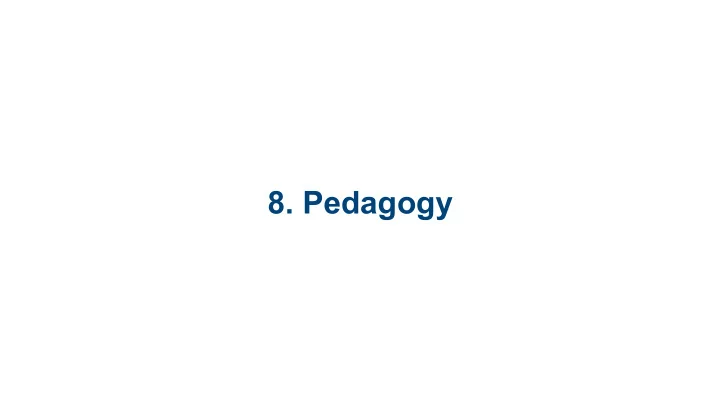

8. Pedagogy
Pedagogy: Big Questions • Is there a best way to teach? • What kinds of teaching work best for different situations? • How do teachers prepare lessons for learning and motivation? • How is teaching subject matter related to classroom management and student behavior?
8.1 Expository Teaching and Discovery Learning 8.2 Advanced Organizers 8.3 Cooperative Learning
8.4 Organizing Information 8.5 Instructional Design and Technology 8.6 Psychology of Content Areas
8.7 Bilingual Education and ESL Programs 8.8 Socioeconomic Status and School Performance
8.9 Teacher Expectations 8.10 Classroom Management 8.11 Summary
8.1 Expository Teaching and Discovery Learning
Expository teaching • Lecture • Demonstration/modeling • Practice • Questioning (at all levels of cognitive taxonomy) • Good for building knowledge, concepts, vocabulary, basic skills • Useful for time constraints
Discovery learning Bruner: Effective learning by experimenting and research • Study phenomenon or problem; ask HOW or WHY • Hypothesize ➔ Research ➔ Test ➔ Report • Good for problem-solving, upper taxonomy levels • Guided discovery to start
8.2 Advance Organizers
Organizing for expository teaching Ausubel: Advance organizers to prepare minds for lesson • This is what we will learn today • This is why it is relevant • This is how it relates to past learning • These are the ideas and vocabulary you will need
8.3 Cooperative Learning
Learning together • Pairs or small groups share task to research or solve • Student Team Achievement Decisions = group decides on best solution • Jigsaw = group divides task, then members contribute to final product • Good to mix abilities/talents
8.4 Organizing Information
Organize for retention Cognitive science strategies • Cluster info with categories, hierarchies, tables etc. • Models, e.g. maps, charts, diagrams, etc. • Elaboration with analogies, mnemonics, acronyms, etc. • Preliminary questions to “get juices flowing”
8.5 Instructional Design and Technology
Tech in education At lower end of cognitive taxonomy • Teacher using/guiding technology • “Drill and practice” • Demonstrations, modeling • Virtual field trips
Tech in education At upper end of taxonomy • Students more in charge of using technology • Gaming and simulations • Research and exploration • Coding, programming • Collaborate in social media ➔ Check for relevance, validity, age-appropriateness
8.6 Psychology of Content Areas
Delivering Content • Balance curriculum scope with pace students need • Teacher’s knowledge of subject, including • Pedagogical content • Priorities/theories of field • Issues, controversies • Teaching to multiple learning styles: auditory, visual, tactile, kinesthetic
8.7 Bilingual Education and ESL Programs
Language learners 1 • Background: many years of immigration/enculturation • Culture debated: deficit or just different? • Current perspective: emphasis on cultural responsiveness • Same language does not mean same culture!
Language learners 2 Kinds of programs in schools • Maintenance = students learn in both languages • Transitional = learn in native language, build English skill • ESL = emphasize English from start • BTW: bilingual ability ➔ increased cognitive ability!
8.8 Socioeconomic Status and School Performance
SES factors in learning Low SES • Low levels healthcare • Low resources for basic needs • Low resources for enrichment • High levels family stress ➔ Low school preparation, low self-efficacy, low achievement (at-risk)
SES factors in learning • Low SES students subject to stereotyping/bias by school staff • See/confirm what you expect to see • Offset with teacher diligence and parent involvement • Especially important for reading/literacy skills
8.9 Teacher Expectations
Raising expectations • Famous study on teacher expectations ➔ Changing expectations can change teacher attitude and student achievement • Expectations communicated by level and quality of interaction, by verbal and non-verbal cues
Raising expectations Strategies that keep expectations high but accommodate all: • Wait time when questioning • Clear descriptions of assignments and grading criteria • Clear and quick feedback
8.10 Classroom Management
Managing environment • Physical, cognitive, and emotional content, not just “behavior management” • Physical: uncluttered, easy movement, flexibly arranged • Cognitive: busy, motivating, relevant content and activity • Emotional: supportive, fair, safe, respectful
Managing environment Styles similar to parenting • Authoritarian: top-down rules and decisions; goal = compliance • Permissive: friendly, allowing, forgiving; goal = harmony, creativity • Authoritative = discussion, explaining, consequences; goal = self-management
Self-management training • Teach to recognize own behavior and its effect on self and others • Pause before acting, speaking • “I” statements, not blame • Inspire personal integrity: • Responsibility for self • Respect for others
Managing environment • Rules: simple, clear, positive • Consequences: consistent, fair, appropriate • Rewards/incentives? • Whole class • Token economy (esp. to bring chaos to order) • Individual (contingency) contract • Assertive discipline = increasing consequences
Managing environment • Monitoring and “withitness” (always see and be seen) • Routines for efficiency • Activities accomplishable, relevant, accountable • Student ownership (chores?) • Other “teacher talk” • Reminding, explaining • I-messages and focus on behavior, not personality
8.11 Summary
Classrooms that work • Many ways to teach/manage • Expectations high yet realistic • Teach by showing/telling or by inquiry/discovery • Organize information for retention, understanding • Manage alertly, consistently, fairly, respectfully
Recommend
More recommend